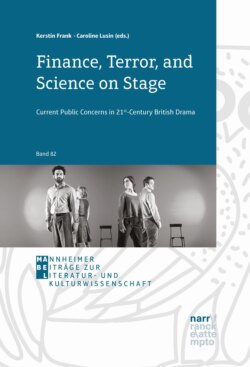Читать книгу Finance, Terror, and Science on Stage - Группа авторов - Страница 20
На сайте Литреса книга снята с продажи.
4. Farce
ОглавлениеThe history of drama in England, particularly that of comic drama, knows many formats that flourished for a time but eventually died out. Shepherd’s plays, interludes and sentimental comedies all have had their day but are now only to be found on library shelves and possibly in the occasional revival by amateurs or directors in search of the unusual. The history of English farce is different: its conventions, themselves inherited from Roman predecessors, have remained surprisingly stable and effective for the last four centuries. William Shakespeare’s Comedy of Errors, an example of the hyperbolic power of the genre, is probably his play least in need of modernisation or explanatory mediation. It was just as hard for 16th-century audiences (or just as easy) as it is for us to accept that twins not only look the same and have the same name, but occur in multiple pairs and never bump into one another despite frantic movement in a small space. Mistaken identity, physical pursuit, repetitive violence of a moderate kind, and above all a sense of futility and inevitability still characterise farce’s morphology.
It is worth noting at this point, however, that the tradition only partially continued: the physicality, the improbabilities, the slapstick survived well; what did not last was the farce as a vehicle for satire. In the 18th century, the power of farce was considered dangerous enough to bring about legislation on censorship. Henry Fielding’s output in particular was deemed so subversive by the authorities that the 1737 Licensing Act forced him to switch to a genre less immediately pernicious: the novel. Since then, farce became cognate with belly laughs and unsophisticated entertainment, the tradition to which Gilbert and Sullivan’s Savoy Operas, Ben Travers’ Aldwych farces and Peter Shaffer’s early plays belong. It is only with the abolition of censorship in 1968 and the outrageous queer farces of Joe Orton that the sense of political relevance is re-instilled in the format, and even then no specific grievances are addressed. In this context, Richard Bean’s decision to engage in the debate about immigration by writing a farce and, what is more, combining it with the format of the history play, is most unusual.
